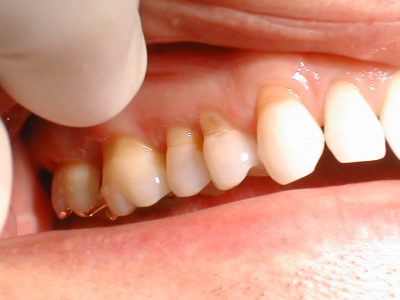Tooth abrasion and tooth erosion refer to a loss of part of the tooth’s outer covering, the enamel, and sometimes deeper parts of the tooth.
Tooth abrasion occurs because of mechanical or frictional force. Brushing too hard is a common cause of the tooth surface wearing away. It also can be caused by devices, such as toothpicks, or removable partial dentures or retainers.
 Tooth erosion generally occurs as a result of chemicals, such as citrus fruits or other acidic foods, wearing away the tooth. Erosion also can be caused by gastrointestinal problems, such as acid reflux, in which stomach acids come up into the esophagus and mouth. Excessive vomiting that occurs with the eating disorder bulimia also can cause tooth erosion. Even the chlorine and other chemicals in a swimming pool can cause erosion over time.
Tooth erosion generally occurs as a result of chemicals, such as citrus fruits or other acidic foods, wearing away the tooth. Erosion also can be caused by gastrointestinal problems, such as acid reflux, in which stomach acids come up into the esophagus and mouth. Excessive vomiting that occurs with the eating disorder bulimia also can cause tooth erosion. Even the chlorine and other chemicals in a swimming pool can cause erosion over time.
Toothbrush abrasion results in V-shaped notches in the lower third of the tooth, near the gum line. If the abrasion is caused by toothpicks, these notches may occur between the teeth. Tooth erosion causes a scooped out, yet smooth, depression on the surface of the tooth.
Both tooth abrasion and tooth erosion can cause tooth sensitivity. You may experience increased sensitivity to hot and cold substances, or significant sensitivity if the enamel is worn away and the dentin (which lies underneath the enamel) is exposed. Dentin protects the innermost part of the tooth (the pulp), which contains nerves and blood vessels.
Abrasion and erosion also can affect the appearance of your teeth.
Once the cause of the erosion or abrasion is identified and stopped, the process usually does not continue. However, additional treatment may be required to restore the tooth and eliminate the symptoms.
To help prevent tooth abrasion and erosion:
- Make sure your diet does not have too many acidic foods or drinks.
- Do not press too hard when brushing your teeth. Use only a soft-bristled toothbrush.
- Use dental floss and toothpicks properly.
If you are unsure of the proper techniques, your dentist can help.
Treatment
Treatment for erosion and abrasion depends on the severity of the damage. If you have a large defect that is very unsightly, you’ll likely want to have the tooth restored. But if there is little damage, and you’re not experiencing any problems with tooth sensitivity, you may not need any treatment.
If your teeth are sensitive, your dentist may recommend certain fluoride treatments for use at home, such as gels and rinses. If you need your teeth fixed, your dentist will use a tooth-colored material to replace the area that has worn away. These materials are called composites or glass ionomers. Your dentist or dental hygienist may also apply a varnish containing fluoride to the affected teeth.
The prognosis is excellent if the problem is caught early, and the cause is eliminated. However, if the process is allowed to continue, the destruction can reach the center of the tooth, the pulp. The longer the actions causing the damage continue, the more work will be needed to correct the problem.
 English
English Ελληνικά
Ελληνικά Русский
Русский